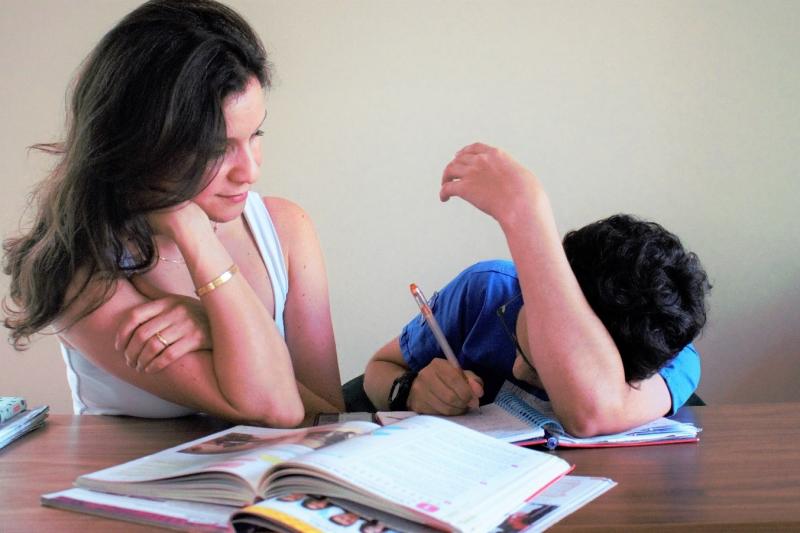Mothers’ Stories
5 Ways to deal with homework struggles with my kids

I am sure that as a mom, like me, you have faced and struggled with homework with one or all of your children. You might have as well swore, screamed, and wished you could flunk all those books out of the window. How many times have you wished for a magic formula that could save you all those tears, breakdowns, and tantrums?!
I am also certain that, like me, you have read a zillion article in trying to find the best teaching methods and interactive strategies that you could implement with your own child in order to smoothly finish all this perplexing school work.
You might have even practiced counting till ten, left the room, or restored to meditation to be able to preserve your patience and calm attitude throughout those long and frustrating afternoons.
And of course, like me, you have blamed yourself, felt horrible and extremely guilty for being unable to provide the assistance needed or because you snapped back at your child when he was in desperate need for positive assurance! To be honest with you, from my experience as a teacher and as a mom, I realized that teaching my own children was a very tough task, as if I haven’t taught a child before, until I succeeded in hitting my targets accurately!

Yes, years back, I did all of this and more, and trust me we still do have our tough moments, but time has taught me and experience has enlightened me. I have been working on myself for the past few years, and I still try to maintain my sanity when it comes to the pressure of homework and exams.
So how can we, as parents, sidestep this drama and what can we do to help our precious children who struggle with homework?
I have been applying the approaches below for a while now, and this is what has worked for us so far.
I do hope that it will also give you an insight on what and how to react with your child when it comes to completing school work:
1. Mantra:
I have created my own mantra “I am the adult!” which I sometimes repeat in my head endless times as I try to understand why my child does not want to cooperate with me. Is it due to fatigue, or lack of sleep, or even having low self-confidence about that subject matter in specific? Is my child afraid of facing a concept he does not understand?
Once I realize the reason behind his non-cooperative manner, and I know that his reaction depends on me and on the way I am confronting the situation, I try to implement a more positive tactic of communication with him and encourage him to set himself to work.
2. Working Alternatives:
I soon discovered the importance of implementing a fixed routine because, like in every family, establishing a solid routine for multiple parenting tasks saves the parents from facing many unnecessary challenges.In our afternoon routine, my child and I agreed on the following:
-
He can have multiple breaks between every completed school task.
The breaks could range from five to fifteen minutes depending on how much time and energy has been consumed. I provide him with the choice to exercise an outdoor or physical activity that he enjoys.
You cannot imagine how successful this method is and it is mentally and physically rewarding to any child and parent alike.
-
We also agreed on dividing the assignments for the week by creating a To-Do-List and synchronize it with his schedule.
Luckily, the school provides the students with a general outline of what is expected to be done during the whole school week. That is why, on weekends, we prioritize what needs to be worked on. This method teaches the child to be systematized and learns how to be organized – and both are great credentials for their future lives.
-
With time, I learned that my child has a pictorial memory.
And everything should be visually sensed in order to be attained. That is why, we work on creating a summary that includes certain drawings or even images. That helps my child to retain the information given, and the possibility of remembering the required information will flow with more ease.
-
The usage of stick notes has also helped in reminding him of certain duties that need to be carried out.
I find these sticky notes very helpful if the child tends to forget certain tasks or obligations. Of course, at the beginning a lot of effort is required from the parents’ side, yet once the child shows a responsible attitude on his own, it is important for the parents to back off and give the child the chance to execute the planning on his own.
-
Finally, the most effective strategy in completing homework efficiently is setting a timer for each given task.
Once a child is capable of visualizing that time ends after a certain period, he would definitely work harder in order to finish the assignment given, and would be able to enjoy his free play time afterwards.

3. Get Help:
Having five children, a packed and active life, and my husband who works for long hours, we knew that it is best to find a professional tutor who would be of great help in times of loaded obligations, assessments, and in other specific situations.
By doing so, I had more time to manage other duties at home and could spend more time with my other children. A tutor does not have to come every single day, but her presence gives a lot of comfort and support to the child and the parent alike.
4. Materialistic Recompenses:
It has been agreed that bribes and materialistic rewards set a bad dynamic, because the child is not awarded for the learning experience but rather for the prize. That is why, I strongly believe that such rewards might not be the best alternative. And as much as I avoid using these materialistic prizes in my parenting policy, sometimes I need to entice him by giving him the chance to get an item he has been wanting for some time.
I admit it is not something I do often or enjoy doing, but sometimes I reach a point where I have no other option left. I also want him to feel pleased and proud of his effort, so if buying him a gift, every once in a while, will help in elevating his self-esteem, then why not?
Note, however, that all of my children know that there are consequences that would be taken if the rules that were set were not followed properly. For example, he would not be able to exercise something he enjoys before he actually finishes his school duties as a priority!
5. Emotional and Verbal Recompenses:
Sometimes a simple warm hug could actually ease the burning anger that has been ignited due to those parent child struggle. I focus a lot on how proud I feel with the process and the effort he has been exhibiting more than on the grades and outcome afterwards.
Effective encouragement, where I actually verbalize the pride I feel towards the hard work my child is demonstrating, boosts his self-esteem and gives him confidence. I try my best to maintain being the empowering parent, where I tell my child that we are on the same team and we are going to succeed. I make him believe in his ability, and I show him that I understand his anxiety.

Finally, it is essential to recognize our child’s positive traits and build from there, and remember all of this requires lots and lots of patience from our sides as parents. After all, working on achieving harmony while doing homework could sometimes be nerve-wrecking and requires a lot of calmness from my side.
Those guidelines have facilitated the process of studying and reviewing at home. However, if you have applied all those tips before, but your child continues to struggle every night with homework and those constant battles keep rising leading to painful meltdowns, it would be the occasion to meet with the teachers and discuss a successful plan to help your child overcome this inner and disturbing defeat.
I strongly believe that a child’s emotional and mental status are far more important than scoring high grades. On the other hand, if it happens that you are blessed with a methodical and responsible child who is willingly motivated and enjoys attaining high grades, then you are one fortunate parent and may this blessing last long!
Disclaimer: I have been wanting to write about this subject years ago, but I still wasn’t ready to share my struggles with my audience. I wanted to communicate my moments of success because by nature I like to reflect and focus on the positive outcome any life experience brings. Now that we are actually diverting towards the right method of tackling homework, I do hope that you find the above mentioned strategies beneficial for you and your child.














